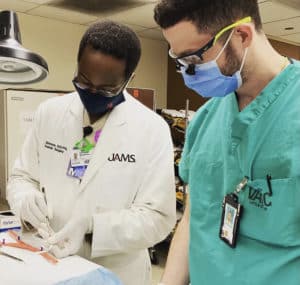Since 1985, the University of Arkansas has had the first and only vascular surgery fellowship program in the State of Arkansas. The acquisition of the technical skills, knowledge, and attitudes necessary for the successful management of patients with complex vascular disorders requires a high level of commitment and dedication from all involved in the process. The educational goals of the Vascular Surgery Residency Program at the UAMS College of Medicine are intended to clearly delineate the specific responsibilities of both fellows and teaching faculty. These objectives have been developed in conjunction with all members of the teaching faculty, previous vascular surgery fellows, and the Association of Program Directors in Vascular Surgery (APDVS).
One of the strengths of the program over many in the country is our balanced combination of not only excellent endovascular experience, but also extensive experience in complex open vascular surgery. At the end of our two-year fellowship, the fellow typically has well over 400-500 major cases which includes an uncommonly large experience in open aortic surgery (coupled with broad exposure to complex endovascular).
During this two-year clinical vascular surgery fellowship, the vascular fellow’s time is divided with rotations between the UAMS Medical Center, the John L. McClellan Memorial Veterans Hospital and the Baptist Health hospital. The UAMS Medical Center is the only academic referral center in the state and its large multi-state referral region, which attracts complex vascular cases from four surrounding states. The vascular fellow is exposed to a variety of vascular reconstructions involving all vascular beds, with cases involving a combined open and endovascular approach. The experience at the VA hospital boasts a very streamlined and state-of-the-art hybrid operating room that operates five days a week. It is not only rich in “bread-and-butter” vascular cases, but also complex index cases, such as renal and visceral bypasses, thoracoabdominal aneurysm repairs, fenestrated endografts and complex re-do lower extremity reconstructions. Finally, Baptist Health is one of the State’s largest community hospital systems and the Little Rock hospital is the referral center for this medical system, attracting both common and very complex cases from around the State. The large hybrid operating room, opened in 2014, allows for advanced vascular surgical imaging and treatment and exposure to private practice.
During all rotations you will have extensive experience in open vascular surgery, a skill that is harder and harder to find in US training programs. Exposure to a wide variety of basic and complex open vascular cases is present at all three hospitals, and the service-based division between senior residents and fellows allows for all trainees to maintain their caseload. In addition to traditional procedures, some of the uncommon skills you can obtain in our program is that we have one of the largest experiences involving deep femoral vein reconstructions for complex aortic and peripheral cases, as well as a significant exposure to traumatic aortic injuries due to our position as a referral center for trauma.
Vascular Laboratory

Experience in the vascular diagnostic laboratory is an essential component of a training program in vascular surgery. During the course of the fellowship, you will expand your knowledge regarding vascular diagnostic tests, the wide range of diagnostic principles and limitations of each technique.Your experience will ultimately allow you to do the following:
- Accurately order appropriate diagnostic tests for the entire spectrum of vascular disorders
- Understand the role of carotid duplex in evaluation of asymptomatic and symptomatic carotid artery disease
- Interpret the result obtained by carotid duplex, including ultrasound image and Doppler velocities
- Discuss the limitations of carotid duplex
- Understand the use of duplex in evaluation of visceral vessels
- Understand the noninvasive test to investigate the extremity arteries
Clinical Research
You should expand your understanding of the principles of research underlies the practice of vascular surgery. While a dedicated research experience is not a component of the curriculum, an opportunity for research is readily available. Our group is proud to be a center that is enrolling for a large number of clinical trials, including the CREST II and is the first (and only since last verification in Feb 2015) center in Arkansas that had access to the Cook fenestrated aortic endograft. Many opportunities exist to present and publish in clinical research with all of our faculty, and all fellows are expected to present and publish every year they are with us.
